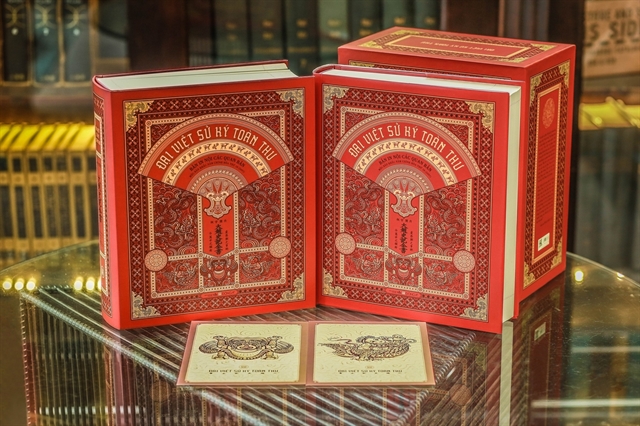
HISTORICAL TEXTS - The new version of Đại Việt Sử Ký Toàn Thư (The Complete Annals of Đại Việt), a national historical series of books in Hán or ancient Chinese characters, has been released by the Văn Học (Literature) Publishing House. — Photo courtesy of the publisher.
HCM CITY — A new version of Đại Việt Sử Ký Toàn Thư (The Complete Annals of Đại Việt), a national historical series of books in Hán or ancient Chinese characters, has been released by the Văn Học (Literature) Publishing House.
It includes two books of the history of Việt Nam from King Dương Vương's reign (2879 BC) to Lê Gia Tông's reign of the later Lê Dynasty (1675).
The first book was translated into Vietnamese by cultural researchers Ngô Đức Thọ and Hoàng Văn Lâu. It was edited by professor and author Hà Văn Tấn.
The second book is a copy in Hán from the original wood block series in 1697.
"Đại Việt Sử Ký Toàn Thư is the oldest official historical text which remains comprehensive up to now. It also is an invaluable treasure of Vietnamese culture, a rich source of information to research into history and other social science branches," said Võ Thuỳ Trang, a final-year student in literature faculty of the HCM City University of Education.
Đại Việt Sử Ký Toàn Thư was written, carved and printed by different generations of historians under the Lê and Trần dynasties, such as Lê Văn Hưu, Phan Phu Tiên, Ngô Sĩ Liên, Phạm CôngTrứ and Lê Hy.
It was first translated into Vietnamese by sinologist Cao Huy Du, and released in 1967.
The series’ highlights include the pages featuring King Trần Nhân Tông, the 4th King of the Trần Dynasty, which lasted for 175 years from 1225 to 1400 with 14 kings.
King Trần Nhân Tông was born and grew up in the capital of Thăng Long, now Hà Nội.
In 1284, being informed of the advance of 500,000 enemy troops from the north, King Trần Nhân Tông summoned a nationwide meeting of elders at Diên Hồng Palace to seek advice on a national defence policy as the situation worsened.
After the great victory over the Chinese Yuan invasion forces, the King ceded the throne in favour of his son Trần Anh Tông, and retreated to the mountain of Yên Tử to practise Buddhism and attain enlightenment, hence the title Royal Buddha.
His contributions to Vietnamese history and culture confirmed his position as a virtuous king and great Buddhist. — VNS
OVietnam